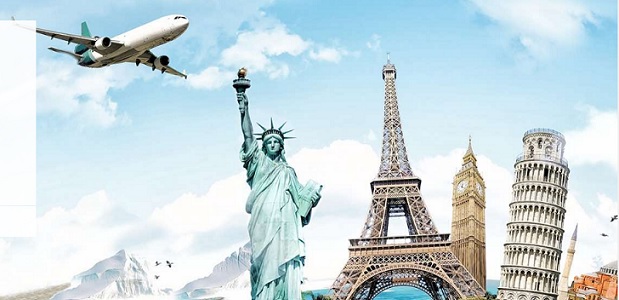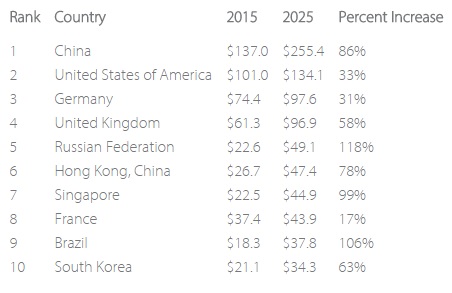Visa study: by 2025, households traveling internationally will surpass 280 million – spending on international travel to reach $5,300 annually

Within the past five years, global tourism has reached new heights. International tourists now account for more than 1 billion travel arrivals and $1 trillion in spending abroad. Over the next 10 years, the growth in travel spending is broadly expected to outpace the global economy.
Visa Inc. released the results of a new study that forecasts a significant increase in international travel by households globally over the next decade. The study estimates that roughly 282 million households will plan at least one international trip per year by 2025, up nearly 35 percent from 2015.
Growing income levels around the world are creating a new “traveling class.” Households making $20,000 USD or more per year account for 90 percent of spending on international travel and about four out of every five international travel arrivals today. By this calculation, nearly half of all households globally will belong to the traveling class by 2025.
Visa estimates travelers from nearly one in three of these traveling class households will take at least one international trip per year. Households in emerging markets will fuel the growth in global travel, representing nearly half of all traveling households by 2025.
The study looked at current travel patterns of Visa-branded cardholders across the globe combined with industry estimates and forecasts for travel. Among those households most likely to travel internationally, Visa’s study estimates that spending will reach an average of $5,305 per household, per year, by 2025. The study also identified key drivers expected to impact global travel over the next decade, including a growing middle class globally, greater Internet connectivity, improved transportation infrastructure across many countries, and an aging global population with more time for leisure travel.
“Traveling internationally will become more common and attainable in the future thanks to changing demographics, combined with technology advances that make traveling abroad easier and less expensive,” said Wayne Best, Chief Economist, Visa Inc. “What will emerge is an expanding “traveling class” that will spend a growing portion of their household income on cross-border travel. Tomorrow’s traveling class will likely be older and hail from emerging markets — looking very different from today’s typical international traveler.”
The study, which was conducted with Oxford Economics, analyzed projected spend by country and region. The chart below shows the top 10 countries based on estimated spend on global travel in 2025.
Travel spend amongst HH’s earning $20K+ annually ranked by projected 2025 spend. Figures are in USD billions (constant 2015 prices).

Highlights of the global report include:
The Rise of a New Global Traveling Class: Growing income levels around the world are creating a new “traveling class”. The study uncovered that worldwide, households that make at least $20,000 per year account for more than 90 percent of spending on international travel today. By 2025 it is estimated that nearly half of all global households (945 million) will be within this income range, spurring greater international travel and spending, particularly by households from emerging markets such as China, Russia, and Brazil.
Global Aging: By 2025, travelers aged 65+ will more than double their international travel to an estimated 180 million trips, accounting for one-in-eight international trips globally. The study estimates that older travelers will be able to afford longer trips that provide greater comfort at higher prices. Trends such as “medical tourism,” whereby aging populations undertake international travel for medical purposes, will also take hold in the future.
Increasing Connectivity: The combined forces of globalization and technology are expanding access. Construction of more than 340 new airports is expected over the next decade, creating new routes and destinations that will make international travel easier and more convenient. At the same time, awareness of travel options is spreading with the rapid uptake in Internet access and the number of mobile devices around the world. Digital connectivity is not only fostering greater spontaneity in travel, but also spurring a broader array of personalized travel and tourism options as well.
An executive summary along with country and region-specific data can be found on www.visa.com/travelinsights.
Methodology
Visa estimated the number of households traveling internationally by comparing Visa-branded cardholders in a given country who have made at least one face-to-face transaction abroad versus the population of all active cardholders in the source country. The figures were adjusted to be representative of the source country’s population regardless of payment methods used by households. The propensities were then used as an input in the forecasts developed by Oxford Economics for the study.
Oxford Economics used survey data on the age and income of international travelers from a sample of 10 countries to calculate international travel frequencies and share of travel by age bracket and income class. The results were extrapolated to a broader set of countries based on their classification as developed or emerging markets and key variables such as GDP per capita and total international arrivals per capita. The estimated travel shares were then compared with each country’s household income distribution and age distribution to develop a historical relationship from which to project international travel shares and volumes by income class and age bracket from 2005 to 2025.
For more details download the full report: Mapping the future of global travel (pdf format)
Dariusz Mazurkiewicz – CEO at BLIK Polish Payment Standard
Banking 4.0 – „how was the experience for you”
„To be honest I think that Sinaia, your conference, is much better then Davos.”
Many more interesting quotes in the video below:









